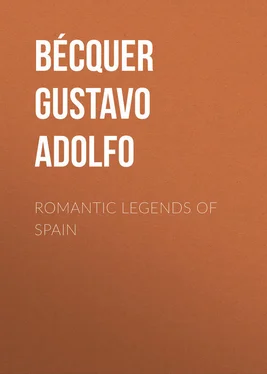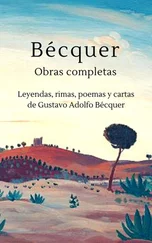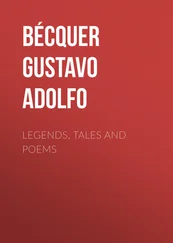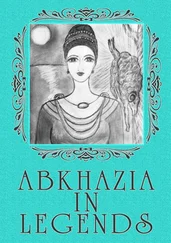Gustavo Bécquer - Romantic legends of Spain
Здесь есть возможность читать онлайн «Gustavo Bécquer - Romantic legends of Spain» — ознакомительный отрывок электронной книги совершенно бесплатно, а после прочтения отрывка купить полную версию. В некоторых случаях можно слушать аудио, скачать через торрент в формате fb2 и присутствует краткое содержание. Жанр: foreign_antique, foreign_prose, на английском языке. Описание произведения, (предисловие) а так же отзывы посетителей доступны на портале библиотеки ЛибКат.
- Название:Romantic legends of Spain
- Автор:
- Жанр:
- Год:неизвестен
- ISBN:нет данных
- Рейтинг книги:4 / 5. Голосов: 1
-
Избранное:Добавить в избранное
- Отзывы:
-
Ваша оценка:
- 80
- 1
- 2
- 3
- 4
- 5
Romantic legends of Spain: краткое содержание, описание и аннотация
Предлагаем к чтению аннотацию, описание, краткое содержание или предисловие (зависит от того, что написал сам автор книги «Romantic legends of Spain»). Если вы не нашли необходимую информацию о книге — напишите в комментариях, мы постараемся отыскать её.
Romantic legends of Spain — читать онлайн ознакомительный отрывок
Ниже представлен текст книги, разбитый по страницам. Система сохранения места последней прочитанной страницы, позволяет с удобством читать онлайн бесплатно книгу «Romantic legends of Spain», без необходимости каждый раз заново искать на чём Вы остановились. Поставьте закладку, и сможете в любой момент перейти на страницу, на которой закончили чтение.
Интервал:
Закладка:
“I was praying; I was praying, all absorbed in my religious meditations, when involuntarily I lifted my head, and my gaze sought the altar. I know not why my eyes from that instant fixed themselves upon the image, but I speak amiss – it was not on the image; they fixed themselves upon an object which until then I had not seen – an object which, I know not why, thenceforth held all my attention. Do not laugh; that object was the golden bracelet that the Mother of God wears on one of the arms in which rests her divine Son. I turned aside my gaze and strove again to pray. Impossible. Without my will, my eyes moved back to the same point. The altar lights, reflected in the thousand facets of those diamonds, were multiplied prodigiously. Millions of living sparks, rosy, azure, green and golden, were whirling around the jewels like a storm of fiery atoms, like a dizzy round of those spirits of flame which fascinate with their brightness and their marvellous unrest.
“I left the church. I came home, but I came with that idea fixed in imagination. I went to bed; I could not sleep. The night passed, a night eternal with one thought. At dawn my eyelids closed and – believest thou? – even in slumber I saw crossing before me, dimming in the distance and ever returning, a woman, a woman dark and beautiful, who wore the ornament of gold and jewel work; a woman, yes, for it was no longer the Virgin, whom I adore and at whose feet I bow; it was a woman, another woman like myself, who looked upon me and laughed mockingly. ‘Dost see it?’ she appeared to say, showing me the treasure. ‘How it glitters! It seems a circlet of stars snatched from the sky some summer night. Dost see it? But it is not thine, and it will be thine never, never. Thou wilt perchance have others that surpass it, others richer, if it be possible, but this, this which sparkles so piquantly, so bewitchingly, never, never.’ I awoke, but with the same idea fixed here, then as now, like a red-hot nail, diabolical, irresistible, inspired beyond a doubt by Satan himself. – And what then? – Thou art silent, silent, and dost hang thy head. – Does not my folly make thee laugh?”
Pedro, with a convulsive movement, grasped the hilt of his sword, raised his head, which he had, indeed, bent low and said with smothered voice:
“Which Virgin has this jewel?”
“The Virgin of the Sagrario,” murmured Maria.
“The Virgin of the Sagrario!” repeated the youth, with accent of terror. “The Virgin of the Sagrario of the cathedral!”
And in his features was portrayed for an instant the state of his mind, appalled before a thought.
“Ah, why does not some other Virgin own it?” he continued, with a tense, impassioned tone. “Why does not the archbishop bear it in his mitre, the king in his crown, or the devil between his claws? I would tear it away for thee, though its price were death or hell. But from the Virgin of the Sagrario, our own Holy Patroness, – I – I who was born in Toledo! Impossible, impossible!”
“Never!” murmured Maria, in a voice that scarcely reached the ear. “Never!”
And she wept again.
Pedro fixed a stupefied stare on the running waves of the river – on the running waves, which flowed and flowed unceasingly before his absent-thoughted eyes, breaking at the foot of the tower amid the rocks on which is seated the imperial city.
The cathedral of Toledo! Imagine a forest of colossal palm trees of granite, that by the interlacing of their branches form a gigantic, magnificent arch, beneath which take refuge and live, with the life genius has lent them, a whole creation of beings, both fictitious and real.
Imagine an incomprehensible fall of shadow and light wherein the colored rays from the ogive windows meet and are merged with the dusk of the nave; where the gleam of the lamps struggles and is lost in the gloom of the sanctuary.
Imagine a world of stone, immense as the spirit of our religion, sombre as its traditions, enigmatic as its parables, and yet you will not have even a remote idea of this eternal monument of the enthusiasm and faith of our ancestors – a monument upon which the centuries have emulously lavished their treasures of knowledge, inspiration and the arts.
In the cathedral-heart dwells silence, majesty, the poetry of mysticism, and a holy dread which guards those thresholds against worldly thoughts and the paltry passions of earth.
Consumption of the body is stayed by breathing pure mountain air; atheism should be cured by breathing this atmosphere of faith.
But great and impressive as the cathedral presents itself to our eyes at whatsoever hour we enter its mysterious and sacred precinct, never does it produce an impression so profound as in those days when it arrays itself in all the splendors of religious pomp, when its shrines are covered with gold and jewels, its steps with costly carpeting and its pillars with tapestry.
Then, when its thousand silver lamps, aglow, shed forth a flood of light, when a cloud of incense floats in air, and the voices of the choir, the harmonious pealing of the organs, and the bells of the tower make the building tremble from its deepest foundations to its highest crown of spires, then it is we comprehend, because we feel, the ineffable majesty of God who dwells within, gives it life with His breath and fills it with the reflection of His glory.
The same day on which occurred the scene we have just described, the last rites of the magnificent eight-day feast of the Virgin were held in the cathedral.
The holy festival had attracted an immense multitude of the faithful; but already they had dispersed in all directions; already the lights of the chapels and of the High Altar had been extinguished, and the mighty doors of the temple had groaned upon their hinges as they closed behind the last departing worshipper, when forth from the depth of shadow, and pale, pale as the statue of the tomb on which he leant for an instant, while he conquered his emotion, there advanced a man, who came slipping with the utmost stealthiness toward the screen of the central chapel. There the gleam of a lamp made it possible to distinguish his features.
It was Pedro.
What had passed between the two lovers to bring him to the point of putting into execution an idea whose mere conception had lifted his hair with horror? That could never be learned.
But there he was, and he was there to carry out his criminal intent. In his restless glances, in the trembling of his knees, in the sweat which ran in great drops down his face, his thought stood written.
The cathedral was alone, utterly alone, and drowned in deepest hush.
Nevertheless, there were perceptible from time to time suggestions of dim disturbance, creakings of wood maybe or murmurs of the wind, or – who knows? – perchance illusion of the fancy, which in its excited moments hears and sees and feels what is not; but in very truth there sounded, now here, now there, now behind him, now even at his side, something like sobs suppressed, something like the rustle of trailing robes, and a muffled stir as of steps that go and come unceasingly.
Pedro forced himself to hold his course; he reached the grating and mounted the first step of the chancel. All along the inner wall of this chapel are ranged the tombs of kings, whose images of stone, with hand upon the sword-hilt, seem to keep watch night and day over the sanctuary in whose shade they take their everlasting rest.
“Onward!” he murmured under his breath, and he strove to move and could not. It seemed as if his feet were nailed to the pavement. He lowered his eyes, and his hair stood on end with horror. The floor of the chapel was made of wide, dark burial slabs.
For a moment he believed that a cold and fleshless hand was holding him there with strength invincible. The dying lamps, which sparkled in the hollow aisles and transepts like lost stars in the dark, wavered before his vision, the statues of the sepulchres wavered and the images of the altar, all the cathedral wavered, with its granite arcades and buttresses of solid stone.
Читать дальшеИнтервал:
Закладка:
Похожие книги на «Romantic legends of Spain»
Представляем Вашему вниманию похожие книги на «Romantic legends of Spain» списком для выбора. Мы отобрали схожую по названию и смыслу литературу в надежде предоставить читателям больше вариантов отыскать новые, интересные, ещё непрочитанные произведения.
Обсуждение, отзывы о книге «Romantic legends of Spain» и просто собственные мнения читателей. Оставьте ваши комментарии, напишите, что Вы думаете о произведении, его смысле или главных героях. Укажите что конкретно понравилось, а что нет, и почему Вы так считаете.












